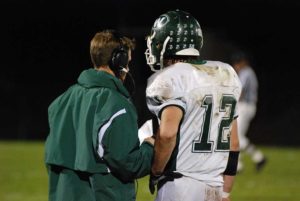Disclaimer: The information on our website is provided for general information purposes only. We make no representations or warranties of any kind, express or implied, about the completeness, accuracy, reliability, suitability or availability with respect to the website or the information contained on our website for any purpose. Any reliance on such information is therefore strictly at your own risk and we are not liable for any damages or losses arising out of or resulting from your reliance on any information contained on our website.
A coach instructs athletes on the skills needed to improve in a sport. Additionally, they can coach an amateur or professional team or even an individual athlete. They also improve a team’s performance and an athlete’s skill through practice drills and conditioning. Coaches are also involved in the recruitment and scouting of potential new talent. Watch a video to learn what a coach does:
How to Become a Coach

Unless coaching children in a recreational sport, paid coaches may attain a bachelor’s degree. Usually, this degree would be in sports science, exercise, kinesiology, physiology, fitness and nutrition, sports medicine, or physical education. Though considerable experience and knowledge in their preferred sport is needed, there is on-the-job training. However, you can also help coach with no coaching experience or formal education. For example, many elementary and middle school age teams are in need of coaches. If you’d like to coach and have no experience, there is probably a team that would appreciate a volunteer!
Being a sports coach comes with several benefits, including helping athletes grow and succeed. Coaches get to share their passion for sports, instill discipline, and build strong teamwork skills. It’s an opportunity to make a positive impact on young lives, fostering character development and lifelong values. Coaches also enjoy staying active, building camaraderie with players, and developing leadership abilities. While it can be challenging, coaching provides a fulfilling and rewarding experience, both personally and professionally.
Job Description of a Coach
If a coach works for an amateur team, they may teach the fundamentals of their sport through demonstration and practice drills. They will teach athletes strategies to win in their sport, rules of the sport, and performance principles. They also monitor athletes and evaluate their fitness and skill to make any needed adjustments or suggestions for the player to improve. A coach is sure to maintain the safe and proper use of any equipment used.
Coaches remain current on new equipment technology, rules, or training techniques that would concern their sport and apply any new knowledge to the game or their athlete. A coach works irregular hours that could include nights, weekends, and holidays. Travel is also required to sports events and in the search for new athletic talent.
Coach Career Video Transcript
No matter what natural talents an athlete brings to a sport, the game can be won or lost by the skill of the coach. Coaches can be patient instructors, demanding bosses, and enthusiastic cheerleaders. Their job is to prepare athletes for competition and victory.
The best coaches also help teams learn from defeat. They may work with young athletes to teach basic skills, then refine and improve the athletes’ form and technique. Or they may manage entire teams, from running practice sessions to planning strategy for a big game. Most coaches also need physical endurance and the willingness to handle difficult outdoor conditions.
Off the field, coaches study team statistics and footage of past practices and games, and work with athletes to improve their performance. A head coach may hire assistants to take on some of the budgeting and scheduling tasks. Some coaches become scouts, looking for fresh talent and looking for new team members or analyzing the strengths and weaknesses of opposing teams to develop game strategies.
Coaches work whenever practices and sporting events are scheduled, often at night and on weekends and holidays. Though an athletics-related college degree is usually preferred, education and training requirements vary widely by sport. Coaches often start as assistants. They work their way up by developing good relationships with players, demonstrating expert knowledge of the sport, and helping athletes or teams improve and win. Some coaches become celebrities in their own right. Others may be stars only to the players they’ve coached, inspiring them long after they’ve left the field.
Article Citations
Bureau of Labor Statistics, U.S. Department of Labor, Occupational Outlook Handbook, Coaches and Scouts.
National Center for O*NET Development. 27-2022.00. O*NET OnLine.

